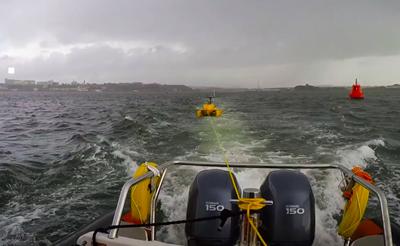Thales relationship makes big autonomous strides

One year since the University of Southampton formed a strategic partnership with Thales, collaboration through the Integrated Mission Management System (IMMS) project is enabling humans to become ‘supervisors’ rather than ‘controllers’ of autonomous vessels.
IMMS addresses the current limitation of autonomous vessels – every vehicle, sensor or payload needs a human to control or monitor it. IMMS aims to make this relationship more productive through ‘autonomous squads’, enabled through a common interface that connects individual vehicles with humans interacting at squad level.
The project was led by Dr Jon Downes, Lecturer in Ship Science and Maritime Engineering, who built a team with expertise from the School of Engineering and the School of Electronics and Computer Science. Staff from Thales, led by Ben Pritchard, also worked on the project.
The 12-month relationship between the University and Thales was celebrated at an event on our Boldrewood Campus in December.
Professor Mark Spearing, Vice President (Research and Enterprise), told the event: “It is great to see the Thales and University of Southampton team come together so quickly in the form of the Integrated Mission Management System project. In the context of the Industry Strategy Challenge Fund programme from the Government, this engagement provides a strong exemplar of successful industry-university joint working.”
John Meston, Operations Director at Thales UK Research, Technology & Innovation, added: “Being here today is a celebration of this uniquely successful programme of work which we have jointly delivered with the University of Southampton. We see this partnership as playing a fundamental role in helping industry and Thales to understand the broader challenges associated with autonomy and its implementation into the real world.”
Phase 2 of the IMMS project will continue this year, when trials will again be undertaken at the Maritime Autonomy Centre at Turnchapel Wharf, Plymouth in September 2020.
Thales has also supported an Alan Turing Institute project, ‘Flexible Autonomy for Swarm Robotics’, led by Professor Sarvapali Ramchurn. There are also plans for the University and Thales to work more closely around recruitment and careers for students.
Thales-funded PhD studentships are on offer, including:
- Effective Fusion of Spatially and Temporally Sparse Data
- Supporting Accountable Decision Making of Humans in Human Machine Teams
- Rigorous V&V Methods for Trustworthy Human-Centric Autonomous Systems
- Flexible Autonomy for Large Human-Agent Collectives